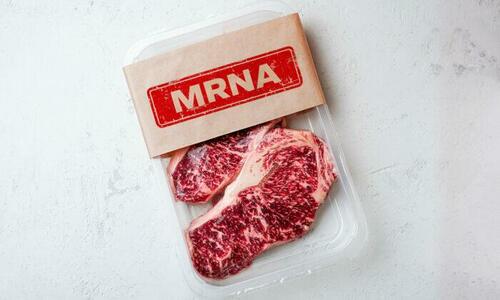Authored by Allan Stein via The Epoch Times (emphasis ours),
At least five states have introduced bills restricting the use of controversial mRNA technology or gene therapies in livestock or demand full disclosure to consumers on product packaging.
The states considering legislation include North Dakota, Tennessee, Arizona, Idaho, and Missouri.
Idaho House Bill 154 would make it a misdemeanor offense for anyone who provides or administers a vaccine using mRNA technology “for use in an individual or any other mammal in this state.”
Arizona House Bill 2762 requires conspicuous labeling of all aquatic, livestock, or poultry products that received mRNA vaccines, and prohibits these products from being labeled as organic.
Tennessee House Bill 0099 amends an existing law to prohibit the manufacture or sale of livestock or meat that contains mRNA “vaccine of vaccines materials” without a conspicuous label that there are such ingredients in the product.
In North Dakota, state lawmakers filed SB2384, which seeks to ban the use of mRNA vaccines in humans and to introduce a penalty for anyone breaking the prohibition.
Missouri State Rep. Holly Jones, a Republican, is the lead sponsor of a bill requiring product labeling of all livestock meat containing “potential gene therapy products.
“We label everything around the world. We label non-GMO. We label GMO. We label grass-fed. We label no antibiotics used. We label manufactured in a plant that has nuts,” Jones said.
“We should label anything that has not been proven safe and effective. As we’ve seen with the COVID vaccines, they’re neither safe nor effective. Even the CDC has come out with that.”
While HB1169 does not mention mRNA by name, the proposed ban would include all “potential gene therapy products.”
The House Emerging Issues subcommittee will review an amended bill on April 19. Jones is a member of that committee.
The bill would require labeling of any product created to act as a potential gene therapy, or that could “otherwise possibly impact, alter, or introduce genetic material or a genetic change into the user of the product.”

It would include anyone exposed to the product or people “exposed to others who have used the product.”
With the passage of HB1169, the law would require livestock farmers and producers in Missouri to fully display on product packaging mRNA technology used in cows, pigs, and other livestock under the rule of informed consent.
Already In Development
“They would have to tell us if they begin using those things. As it is currently, almost all states do not,” Jones said.
Jones said she confirmed through multiple agricultural sources that mRNA programs for U.S. livestock are “in the works.”
“It is in the pipeline. Australia is already doing that.”
According to a statement from the Queensland government in Australia, scientists are working to develop an mRNA-related vaccine to combat the threat of Lumpy Skin Disease (LSD) in beef cattle with $1.5 million invested.
“A new mRNA vaccine would be a game changer as the live virus vaccines currently available overseas cannot be used in Australia,” said Mark Furner—the Minister for Agricultural Industry Development and Fisheries and Minister for Rural Communities—in the statement.
“Using existing vaccines here would result in us losing our disease-free status,” Furner added.

With mRNA technology, as in COVID-19 vaccines, the injections introduce a virus fragment into cells, teaching them how to produce a specific antibody against the disease.
The Veterinary Microbiology and Preventive Medicine Department at Iowa State University is developing an mRNA-based cattle vaccine for the bovine respiratory syncytial virus (RSV).
Untreated, RSV can lead to pneumonia in cows.
The federal grant program aims to develop a “novel mRNA system” that provides immune protection against RSV.
“We hypothesize that a [mRNA injection] delivered continuously by vaccine implant will lead to prolonged and robust cellular and antibody immunity,” according to a program summary in the U.S. Department of Agriculture’s Research, Education, and Economics Information System (REEIS).
“Here, we will optimize our vaccine further and then test for potential correlates of protection to examine for in eventually challenged cows.”
No Labeling of Foreign Meat
In 2016, the U.S. Congress removed a labeling law requiring the country of origin on meat products.
Read more here…








